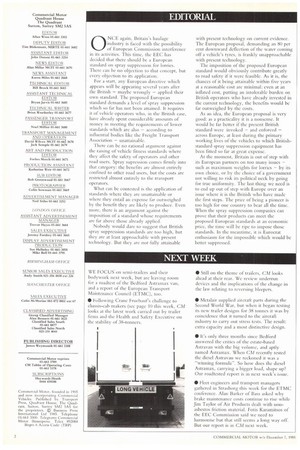NCE again, Britain's haulage
Page 4

If you've noticed an error in this article please click here to report it so we can fix it.
IDindustry is faced with the possibility of European Commission interference in its activities. This time, the EEC has decided that there should be a European standard on spray suppression for lorries. There can be no objection to that concept, but every objection to its application.
For a start, any European directive which appears will be appearing several years after the British — maybe wrongly — applied their own standard. The proposed European standard demands a level of spray suppression which so far has not been attained. It requires it of vehicle operators who, in the British case, have already spent considerable amounts of money in meeting the requirements of lower standards which arc also — according to influential bodies like the Freight Transport Association — unattainable.
There can be no rational argument against the raising of vehicle fitness standards where they affect the safety of operators and other road users. Spray supression conies firmly into that category: the benefits are almost entirely confined to other road users, but the costs are restricted almost entirely to the transport operators.
What can be contested is the application of standards where they are unattainable or where they entail an expense far outweighed by the benefit they are likely to produce. Even more, there is an argument against the imposition of a standard whose requirements are far above those already applied.
Nobody would dare to suggest that British spray suppression standards are too high, but they are at least approachable with present technology. But they are not fully attainable
with present technology on current evidence. The European proposal, demanding an 80 per cent downward deflection of the water coming off a vehicle's tyres, is frankly unapproachable with present technology.
The imposition of the proposed European standard would obviously contribute greatly to road safety if it were feasible. As it is, the chances of it being attainable within five years at a reasonable cost are minimal: even at an inflated cost, putting an intolerable burden on British operators who have already invested in the current technology, the benefits would be far outweighed by the costs.
As an idea, the European proposal is very good: as a practicality it is a nonsense. It would be far better if the present British standard were invoked — and enforced — across Europe, at least during the primary working lives of the vehicles to which Britishstandard spray suppression equipment has been fitted so far at great expense.
At the moment, Britain is out of step with its European partners on too many issues — such as maximum weights for lorries — by its own choice, or by the choice of a government not willing to risk its political neck by going for true uniformity. The last thing we need is to end up out of step with Europe over an issue where it is the British who have made the first steps. The price of being a pioneer is too high for one country to bear all the time. When the spray suppression companies can prove that their products can meet the proposed European standards at an economic price, the time will be ripe to impose those standards. In the meantime, it is Eurocrat enthusiasm for the impossible which would be better suppressed.




































































































